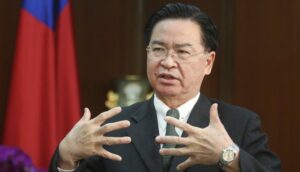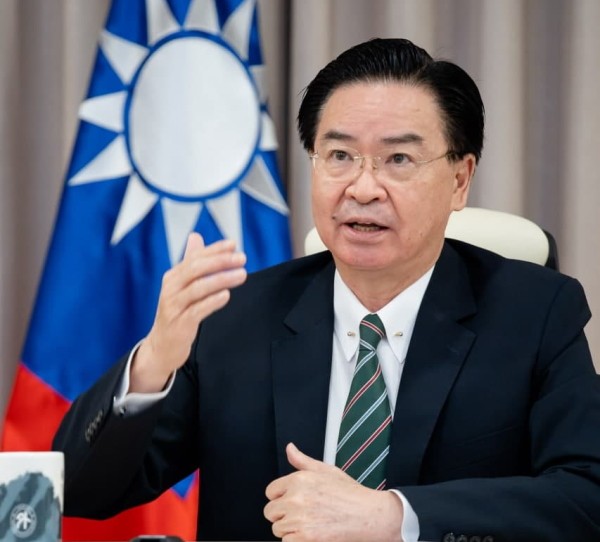Taiwan Foreign Minister says conflict with China would have ‘disastrous results’.
A Chinese invasion of Taiwan would have “devastating consequences” for the world, warned Foreign Minister Joseph Wu in an interview with AFP on Wednesday. He emphasized Taiwan’s significant importance for the semiconductor industry and global shipping.
As Taiwan nears the presidential election, Wu warns of mounting pressure from China.
Beijing claims Taiwan as its own territory and has repeatedly vowed to take it one day, even by using force if necessary.
Wu stated that any use of force against Taiwan would have worldwide repercussions.

“We need to clarify to the international community that any conflict involving Taiwan will lead to catastrophic consequences for the rest of the world,” said Wu. He pointed to the food and fuel shortages, as well as rising inflation, resulting from Russia’s invasion of Ukraine.
A cross-strait conflict would significantly impact the global shipping industry due to the strategic waterway.
Freedom of navigation is, therefore, one of the “essential elements of international security and prosperity,” Wu said.
Taiwan also holds a near-monopoly on producing semiconductors, the microchips crucial for the modern economy and powering everything from basic coffee machines to advanced weaponry like missiles and defense infrastructure.
“Consider the disruption of the supply chain,” the minister said.
“We hope that the Chinese government will not resort to using force against Taiwan, as the impact will be too severe for the world.”
Disinformation Campaign in Taiwan’s Presidential Election
Before January’s presidential election, Taiwan faces a “more sophisticated” disinformation campaign to influence its 23 million population, Wu warns.
“What China has been doing in engaging in cognitive warfare is to change the thinking of the critical minority here in Taiwan – to vote the other way so they can change the outcome of the election,” he added.
Wu is a member of the Democratic Progressive Party (DPP), seen as more pro-United States than the opposition Kuomintang Party.
DPP led by President Tsai Ing-wen, disliked by Chinese leadership for not accepting China’s ownership of Taiwan.
Taiwan might be next
Relations between Taiwan and China have worsened since Tsai’s election in 2016, with Beijing refusing to engage with Taipei.
Global attention on cross-strait tensions has increased in the past year, which Wu attributes to Russia’s invasion of Ukraine.
“(The international community) look around… and then realize Taiwan might be the next one. They look at the Chinese track record of threatening Taiwan,” he said, pointing to a frequently mentioned timeline of 2027 as a possibility for a Chinese invasion.
US officials have said they believe China would not have the military capability to undertake such an operation before then.
Taiwan cautiously observes China’s internal political situation following the abrupt removal of Qin Gang as foreign minister. Beijing has given no explanation for his dismissal, and he has not been seen in public for over a month.
“This is a situation that requires us to be very cautious in our observations. We do not want to become a scapegoat of Chinese troubles,” Wu said.
Since Nancy Pelosi’s visit to Taipei in August, Taiwan has faced near-daily Chinese warplane incursions and naval vessel patrols in its air defense zone, angering Beijing.
The frequency is “putting Taiwan in a situation where our defense depth is reduced, our response time is shortened, and the military threat is more serious than ever,” Wu said.
Moral support and military assistance, such as the $345 million aid package announced by the Pentagon at the weekend, are appreciated.
However, Taiwan does not rely on the US to fight a war for them.
“We understand that this is our place, this is our country, this is our sovereignty, and it is our democratic way of life… Therefore, defending Taiwan is our own responsibility,” Wu said.
“We will not give it up for anything at all.”
